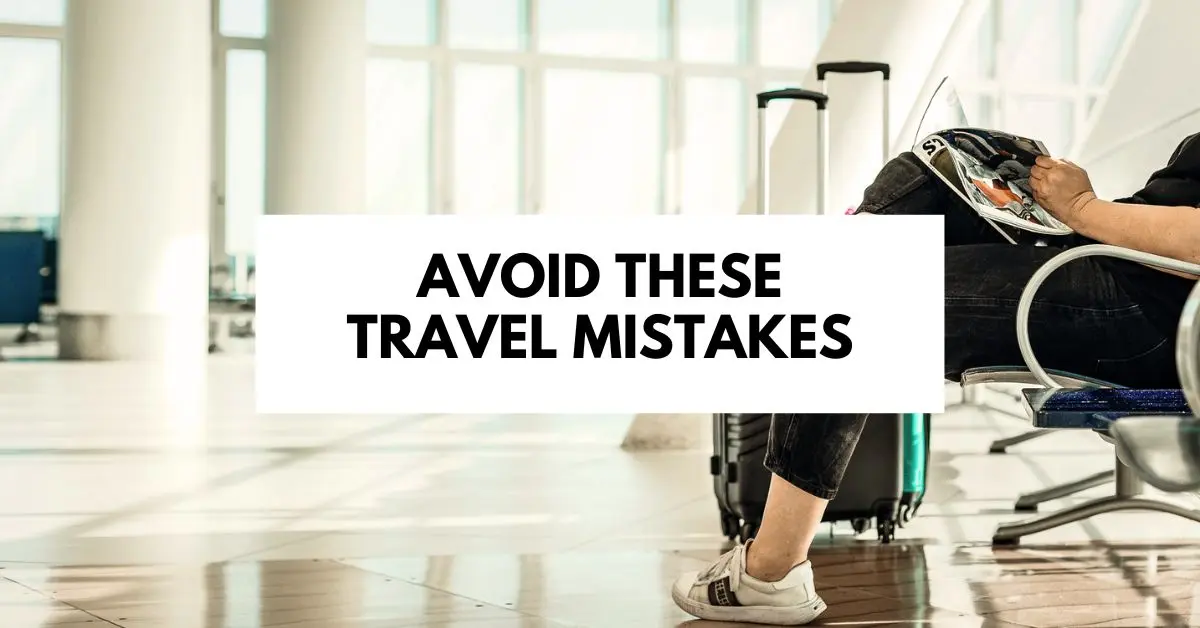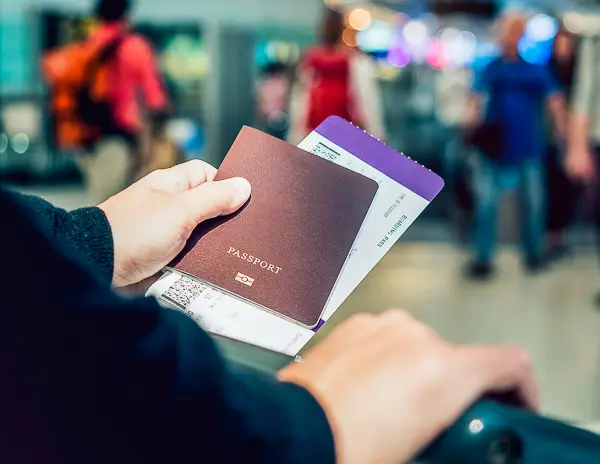20 Travel Mistakes to Avoid: Travel Smarter, Not Harder
Planning a trip is exciting, but small oversights can lead to major travel mistakes. We recently had a close call that almost derailed our vacation.
Late one night, my husband asked, “What date do we fly out to Rome again?” Annoyed, I told him, thinking that was the end of it. But then he realized we’d arrive in Rome just a few hours before our cruise, not the day before as planned. My heart sank as I realized we’d never reach the ship in time.
We had booked a cruise from Civitavecchia, Italy, and one key tip is to arrive at least a day before embarkation. Despite my careful planning, I made a common travel mistake. Thankfully, we caught it early and changed our flight without extra cost. Unfortunately, I had also booked our hotel for the wrong date, so we had to find another place to stay.

Disclaimer: This post may contain affiliate links, meaning we earn a commission at no extra cost. Please refer to our full disclosure for details.
Ultimately, it worked out, and I hope we avoid any more major travel issues. Minor mishaps are inevitable, but you can avoid common travel mistakes with some extra care. This article shares tips to help you plan better and travel smarter.
Travel doesn’t have to be stressful. You can avoid pitfalls and enjoy a smooth trip with research and preparation. Stay flexible, and don’t hesitate to ask for help when needed. In this article, I’ll share 20 travel mistakes along with tips to avoid so you can enjoy a better travel experience.
Travel Mistakes to Avoid
1. Not Checking Your Passport or Visa Requirements

As soon as you start planning international travel, check your passport. Make sure it’s not expired or close to expiring. The last thing you want is to arrive at the airport only to discover you can’t board your flight or, worse, be denied entry at customs because your passport is within six months of expiring.
Also, don’t forget to check visa requirements so you can submit any applications well in advance.
2. Not Doing Enough Research
Before you travel, research everything—from the local culture to how the train system works. Don’t be caught off guard upon arrival.
- Check if the sites you plan to visit are open when you’re there. Sometimes museums have specific closed days. We missed entering the Louvre in Paris because it was closed.
- Businesses may be closed on Sundays or Mondays. We found this out the hard way on a Sunday trip to Parma—many spots, including some great foodie places we wanted to try, were closed.
- Watch out for holidays and festivals, which can impact your experience.
- Research hidden gems and off-the-beaten-path spots that might not be in travel guides. Facebook groups and forums can be great resources. And don’t hesitate to ask locals when you arrive.
3. Not Budgeting
Travel can be expensive, and budgeting appropriately is essential when planning. Make sure to factor in all your expenses, including transportation, accommodation, food, and activities. You don’t want to find yourself halfway through your trip with maxed-out credit cards and zero in your bank account because you overspent. Create a realistic budget and do your best to stick to it.
Tip: Set aside a small portion of your budget as an emergency fund or for spontaneous experiences during your trip. Look for ways to save money, like comparing vacation rentals to hotels, preparing some or all of your meals, and prioritizing spending based on what’s most important to you. You can have a fantastic travel experience without breaking the bank.
Read more: Smart Ways to Save for Your Next Trip
4. Not Booking Accommodations in Advance
While spontaneous trips can be fun, waiting until the last minute to book accommodations can be risky. If you wait until the day of arrival to find a hotel, you might end up without a place to stay—especially during peak season in popular tourist destinations. The closer you are to your travel dates, the more in-demand rooms become, leading to higher nightly rates.
Tip to prevent this travel mistake: Research and book your accommodations early with a flexible cancellation policy. This way, you can secure a cheaper rate, giving you peace of mind while you continue planning. You can also re-check rates as your travel dates approach if prices drop, allowing you to rebook at a better rate.
5. Not Double-Checking Your Flight Details
As I mentioned earlier, it’s crucial to double-check all your flight details—including dates, departure times, and arrival times. If you have something planned, like an event or a cruise, make sure you’re arriving with enough cushion time to avoid any chance of missing it.
Remember time zone differences and overnight flights. When flying internationally, there may be a connecting flight to your final destination, and you’ll likely need to go through customs.
6. Not Having Travel Insurance
One of the biggest travel mistakes to avoid is skipping travel insurance. It provides peace of mind and protects you from unexpected financial hits like illness, accidents, or lost luggage.
- Use a credit card to book your travel to take advantage of the travel insurance benefits many cards offer.
- Review the coverage provided by your credit cards to see if it fits your needs—you may not need separate insurance, but sometimes it’s worth getting.
- It’s best to purchase separate insurance for cruise vacations to cover medical expenses and potential emergency evacuations.
- Don’t let the cost of travel insurance deter you—the cost of an unexpected event can be much higher.
7. Avoid Overpacking

One of the biggest travel mistakes is overpacking. We’re all guilty of it, often due to those “what ifs” that make us pack items just in case. But by sticking to the essentials and packing light, you can avoid dragging around a large suitcase and paying extra baggage fees.
How to avoid overpacking? Here are a few tips:
- Plan your outfits ahead of time. Create a capsule wardrobe so you can mix and match pieces.
- Wear your bulkiest items on travel days to save space in your luggage.
- Consider doing laundry halfway through your trip. Check if there’s a laundromat nearby or if laundry facilities are available at your accommodation. You can also handwash a few items as needed.
- Take note of what you didn’t use on your trip so you can pack smarter next time.
8. Wasting Time On Lines
We’re big fans of skip-the-line tours and tickets when available. Standing in long lines to enter a site wastes valuable vacation time. It’s not that the experience isn’t worth it, but time is limited, and you want to make the most of it.
Consider paying a bit more for skip-the-line entry. Having a tour guide bring you straight inside, bypassing the chaos, is often worth the extra cost.
Investing in TSA PreCheck, Global Entry, or Clear is another way to avoid wasting time in lines, especially at airports. These programs can significantly reduce the time spent in security and customs lines, letting you start your trip with less stress.
9. Don’t Cram Everything in a Short Time
We’ve been guilty of this travel mistake, especially when cruising the Mediterranean or traveling through Europe. With limited vacation time, trying and seeing everything is tempting, but this often leads to burnout and a less enjoyable experience.
How do you combat the urge to cram everything in? Focus on what you truly want to see and do. Depending on your time in a destination, pick a few key sights and tours that genuinely interest you. Prioritize what excites you rather than following a travel guide’s must-see list.
Take time to enjoy what’s around you. Sitting in an outdoor café with a cappuccino or pausing to take in a mountain view allows you to appreciate the moment.
Another tip: Build downtime into your itinerary. Schedule time for relaxation, exploration, or simply wandering without a plan. This helps you recharge and enjoy the destination at a slower pace.
10. Not Letting Your Bank and Credit Card Companies Know About Your Travel Plans
During our first trip abroad, we did not notify our bank but not our credit card company. We quickly learned this when our credit cards were declined due to what was flagged as suspicious activity.
Back then, credit card companies didn’t automatically detect that you were out of the country based on your flight purchases like they do today. You had to submit a form, and we hadn’t done that. It was an embarrassing and frustrating experience that required a call to customer service to get things sorted out.
Nowadays, many credit cards have advanced technology that might recognize your travel plans based on your purchases. However, don’t get too comfortable with that. It’s still wise to call your credit card companies and bank to let them know you’ll be traveling. This can help you avoid issues when charging purchases or withdrawing money from an ATM with your debit card.
11. Not Respecting Local Customs
Respecting the local customs and traditions when traveling to a new destination is part of being a good traveler. This includes dress codes, behavior in public places, and respect for local religious practices.
12. Paying Too Much Attention to False Narratives
It’s easy to get caught up in exaggerated warnings about certain destinations, which can create unnecessary fear about places that are actually safe.
Before our cruise to the Mexican Riviera, the U.S. government raised the threat level for Mazatlán. We wondered if our itinerary would change, but it didn’t. We proceeded as planned and took a food tour around Mazatlán, where we felt completely safer than in some parts of LA. Often, these warnings apply to specific areas, like deep in the rural countryside, but that’s not always clear.
Tip: Check local Facebook groups for recent insights from travelers and locals. They’ll give you a more accurate perspective on safety.
13. Not Being Aware of Your Surroundings
It’s important to stay cautious and aware of your surroundings wherever you travel to avoid scams or theft. Be mindful of local scams, pickpockets, and other safety risks.
Tips to stay safe:
- Keep your valuables close to your body.
- Avoid carrying large amounts of cash.
14. Not Making Copies of Important Documents & Identification
Always have scanned copies of important documents and identification stored securely where you can access them.
This includes:
- Passports
- Birth certificates
- Driver’s licenses
- Social security cards
- Any other critical legal documents
With digital copies, you can easily retrieve them in case of an emergency or if you need to provide them. For example, if your wallet or bag is stolen along with your passport, you’ll have your digital documents ready to provide to the U.S. Embassy.
15. Not Staying Hydrated and Nourished
Staying hydrated and nourished during your travels is essential for keeping your energy levels up and avoiding discomfort. Bring a reusable water bottle or pack electrolytes to keep your body functioning properly. Dehydration can lead to fatigue, headaches, and digestive issues, so drink water throughout your trip, especially during flights.
Don’t forget to pack a snack like power bars or nuts. It’s easy to assume you’ll find food when you need it, but airport shops might be closed, flights could be delayed, or the food available might not meet your dietary needs. Having snacks on hand ensures you’re prepared for any situation, whether a long flight, a late arrival, or just a busy day of exploring.
16. Not Learning Basic Phrases in the Local Language
A simple way to enhance your travel experience is by learning key phrases in the local language. It’s a sign of respect and a mark of a savvy traveler.
Knowing basic phrases like “hello,” “thank you,” and “excuse me” can help you navigate your surroundings more efficiently and connect with locals in a meaningful way. Even if you’re not fluent, locals will appreciate your effort.
Tip: Download the Google Translate app to your phone. It’s a handy tool for communicating or understanding more complex phrases during your travels.
17. Wearing the Wrong Shoes
The kind of shoes you pack depends on your destination, activities, and the weather. Always pack appropriate footwear for your trip. For example, if you’re walking on cobblestone streets in Italy and doing over 10k steps daily, comfortable walking shoes with support are essential—leave the heels at home. Pack shoes that are broken in and won’t give you blisters.
Of course, flip-flops may be fine if you’re heading to the Caribbean to relax on the beach.
18. Not Traveling With a Portable Charger
In today’s world, carrying a portable charger for your mobile phone is a must-have. We rely on our phones for everything—from Google Maps to taking photos and videos throughout the day.
The more you use your phone, the faster the battery drains. The last thing you want is to be in a foreign destination with a dead phone, unable to access it in case of an emergency.
19. Not Having An International Cellphone Plan
While having an international cellphone plan might seem optional, not having reliable access to data when you need it can quickly turn into one of the biggest travel mistakes. You may have Wi-Fi at your hotel, but once you’re out and about, you’ll need cellular data to use essential apps like WhatsApp or Google Maps.
Without a dependable connection, you could find yourself lost, stranded, or unable to access important information. Many travel apps and services require an internet connection to work effectively.
To avoid this, consider these options:
- Research international cellphone plans before you travel.
- Purchase a local SIM card upon arrival.
- Set up an eSIM option before your flight.
For example, we use the T-Mobile international plan with unlimited basic data and texting, which has worked exceptionally well for us.
20. Not Having a VPN

Overlooking the importance of a VPN while traveling can lead to several issues. A VPN is valuable, especially if you plan to use public Wi-Fi.
Here’s why a VPN is needed:
- Security: Public Wi-Fi networks can expose your personal information to hackers. A VPN encrypts your internet traffic, making it unreadable to anyone trying to intercept it.
- Online Privacy: A VPN masks your IP address and location, preventing websites and advertisers from tracking your online activities.
- Access to Content: Some websites and online services are only available in certain countries. With a VPN, you can connect to a server in the required country and access content as if you were physically there.
- Avoid Censorship: The government blocks certain websites and services in some countries. A VPN lets you bypass these restrictions by switching the location of your IP address.
We use Surfshark VPN. The app is installed on our phones, Kindle TV Stick, and computers.
What are some mistakes travelers make when they visit other countries?
Some common mistakes include assuming everyone speaks English, disregarding cultural differences, and not respecting local customs and traditions. It’s important to be respectful and open to experiencing different cultures through their food, people, and way of life.
What can go wrong when traveling?
Travel can involve flight delays, lost luggage, accidents, or unexpected events. While these risks are low, it is important to be aware, prepared, and flexible. Purchase travel insurance, back up important documents, and keep emergency contacts on hand. Always have a backup plan and stay informed about any disruptions or changes to your itinerary.
BEFORE YOU TRAVEL, CHECK OUT THESE RELATED READS:
- Pack Your Personal Bag With These Essentials
- Travel Like a Pro With These Travel Tips
- Tips to Book and How to Use Airbnb
- Airbnb Pros and Cons
Kathy Ava
Meet Kathy Ava, a food, travel, and cruise writer based in Los Angeles/Pasadena, and the owner and main writer of Tasty Itinerary. With over 20 years of experience planning trips and logistics at her full-time job and for herself, she's become a pro at crafting unforgettable tasty itineraries. She's always on the hunt for delicious, fun travel destinations and cruise itineraries. She firmly believes that life is short and we must make the most of it, so always say yes to dessert.



